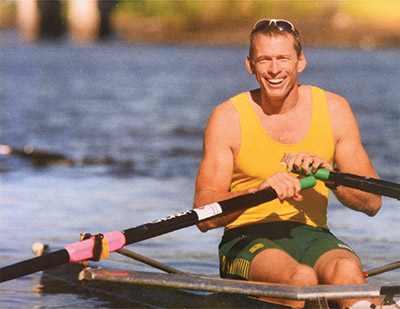
Rowing
- Hobart
- 25th May 1973
- 25th March 2017
True champions achieve that mantle through life's toughest examination the test of time. That's why tonight's Gold Coast Sporting Hall of Fame inductee, Duncan Free, is regarded as one of the greatest oarsmen in Australian Rowing history.
Free wasn't just the best, winning world championships and Olympic gold; it was his ability to stay at the top, or to climb back to the pinnacle after adversity that stamped him as a unique athlete.
When Reg Free, his wife Helen and their children, Marcus, Anita and Duncan made the move from Hobart to the Gold Coast in 1963, little did they know their new home would become the breeding ground for Australia's rowing elite.
It was from here that Reg, a champion oarsman who represented Australia on three occassions, began a coaching dynasty that would guide his sons to state, national and international glory.
Marcus and Duncan became elite oarsmen of the highest calibre and versatility, rowing together in scull in sweep - oarred boats in national champtionships for their adopted state of Queensland and in world championships regattas in the green and gold of Australia.
But it was the younger brother whose sporting star shone the brightest. Duncan first represented Australia in 1991, when he won a silver medal at the Junior World Rowing Championship, before gaining senior selection in 1994.
Two years later he rowed at the Atlanta 1996 Olympic Games, winning bronze in the men's quad sculls and a remarkable Olympic journey was underway.
Duncan narrowly missed medals in the same boat class at the Sydney 2000 and Athens 2004 Olympic Games before taking a year's sabbatical and switching to sweep rowing with another seasoned campaigner in three-time Olympic gold medallist and 11Oarsome Foursome" member Drew Ginn.
The new combination soon proved to be the world's best coxless pair, winning consecutive world championships in 2006 and 2007 before a memorable victory at the Beijing 2008 Olympic Games. Duncan was a strong contender for the London 2012 Olympic Games, until he was hit by a car while cycling on the Gold Coast in 2011.
He sufferred a right femur fracture, which led to stress fractures in his ribs, forcing his retirement from competitive rowing in 2012.
But it was far from a retirement from sport as he has since channelled the experience of competing at four Olympic Games and ten world championsliips into a valuable coaching asset at Griffith University where he is the Director of the Griffiths Sports
Inductees
- Andrew Baildon
- Anna Wood
- Anne Alletson Brown
- Catherine Huggett
- Colin Birmingham
- Craig McDermott
- Dale Collings
- Danielle Harte nee Drady
- Debbie Bowman-Sullivan
- Debbie Holland
- Duncan Free
- Emma Snowsill
- Eric Boulter
- Gary Metcalfe
- Giaan Rooney
- Grant Davies
- Grant Hackett
- Greg Brough
- Greg Shambrook
- Ian Rowling
- Ian Schuback
- Janet Rayner
- Jason Crump
- Jenny Lund
- Jenny Whittle
- Joel Parkinson
- John Franklin
- Karla Gilbert
- Katrin Borchert
- Kerri-Anne Weston
- Loretta Harrop
- Mark Bennetts
- Mick Doohan
- Mick Fanning
- Mick Veivers
- Miles Stewart
- Nathan Sharpe
- Ossie Moore
- Paul Neilsen
- Peter Drouyn
- Peter Lacey
- Peter Townend
- Robbie McEwen
- Sara Carringan
- Trevor Hendy
- Wally Morris
- Wayne Hammond
- Wayne 'Rabbit' Bartholomew